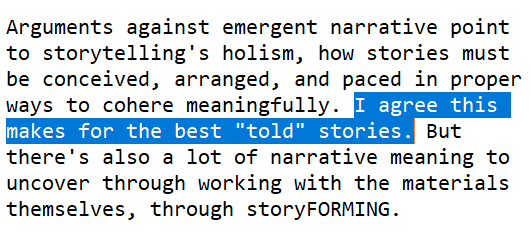Max's thread on tools that encourage reflection gets at an important facet of what I'm coming to understand emergent narrative to be: a cracking open and reification of the creative process. https://twitter.com/maxkreminski/status/1272241374318825474
Arguments against emergent narrative point to storytelling's holism, how stories must be conceived, arranged, and paced in proper ways to cohere meaningfully.
But there's also a lot of narrative meaning to uncover through working with the materials themselves, through storyFORMING.
Emergent narrative emerges through the paired sieves of system and interpreter. It's formed, like all stories, but the emphasis is on the forming. Storyforming is messier than storytelling: there are mixed meanings, walkbacks, the pace is bungled. It's a story in live edit.
But editing is narrative. It's a tour through the possibility space the story lives in, through the access corridors and backrooms, where the mechanisms of coherence are working. Reflection is one of the operations available here.
I can't find a concise definition but there are parallels here with Eve Sedgwick's concept of reparative reading (thanks to @catacalypto for pointing this out a while ago).
The point summed up: emergent narrative is like an interactive tour through the story factory and is its own modality of storytelling. By putting you in the writers' room, it illuminates new sectors of the meaning space that the story itself is articulating.
Realizing I bungled something from my drafts wrt storytelling's holism, which is a perspective I'm in partial agreement with. The point of the thread was to argue that it's not the whole story.
The holistic story isn't the wholistic story
you might say
you might say

 Read on Twitter
Read on Twitter


